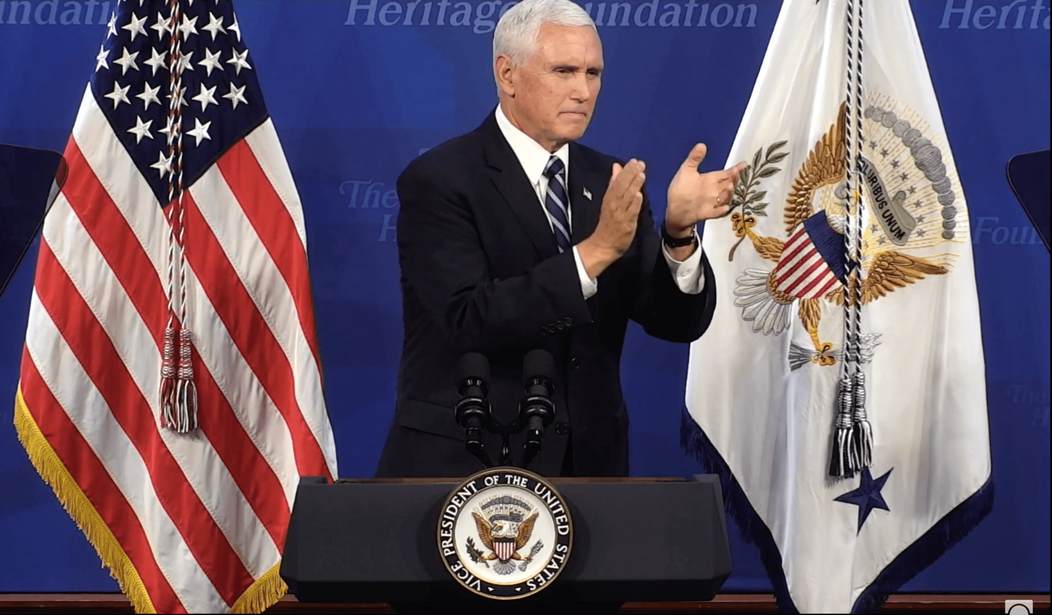WASHINGTON, D.C. — On Tuesday, Vice President Mike Pence called on Congress to pass the United States–Mexico–Canada Agreement (USMCA) — a trade deal between the U.S., Mexico, and Canada. He said the deal would add more momentum to an already “booming” economy. The agreement was drafted last September, and Mexico agreed to the deal in June. Democrats are stalling the USMCA, focusing on labor and environmental issues. Even so, House Speaker Nancy Pelosi (D-Calif.) has said Democrats are on a “path to yes” on the trade deal.
Pence said the USMCA represents “one more opportunity to add even more momentum to an American economy that is booming.” He noted that “lower taxes, less regulation, more American energy, greater individual liberty” helped bring about America’s robust economic growth, and the trade deal will help further those efforts.
“This president has signed more laws cutting federal red tape already than any president in American history, saving more than $33 billion in regulatory costs,” Pence noted. “Today, the United States is the largest producer of oil and natural gas in the world. This president kept his promise in the early days of the administration when he signed into law the largest tax cuts and tax reform in American history.”
Pence also noted that since Election Day 2016, businesses in America created more than 6 million new jobs and the U.S. unemployment rate hit a 50-year low (in May of this year). He claimed that more than 7 million Americans have been lifted off of food stamps (the actual number is 4.5 million, but still high), and that “wages are rising at their fastest point in more than ten years.”
The USMCA would add to this economic growth by updating the trade relationships with Canada and Mexico, the vice president argued. He criticized the North American Free Trade Agreement (NAFTA) as destructive for U.S. manufacturing. While “one administration after another stood by and watched unfair trade practices hollow out American manufacturing in particular,” Trump “promised to fight for American jobs and workers.”
“We’ve ended the era of economic surrender and we’re using the power of the strongest economy in the history of the world to put our jobs and our workers first. And now American jobs and American workers are winning again,” Pence declared.
“I remember when the last administration lost 200,000 manufacturing jobs, and literally the last president said that those jobs were gone for good. He said, ‘what do you got, a magic wand to bring them back?’ We didn’t need a magic wand. We just need President Trump in the White House. We’ve seen 500,000 manufacturing jobs created since Election Day alone,” he said.
The return of manufacturing jobs is nothing to scoff at, but the current state of U.S. manufacturing is still far behind its strength in the mid-20th century or even the 17.1 million jobs in 2001. Americans often envision manufacturing as the model for economic success, hearkening back to the American powerhouse economy of the 1950s and 1960s, forgetting that America dominated world manufacturing precisely because most of the world’s manufacturing economies had been devastated by World War II while the U.S.’s was not. Americans should not seek to return to a golden age of manufacturing.
Yet Pence focused on more than just manufacturing. He cited the International Trade Commission’s report on the USMCA, which found that the trade deal “will add nearly $70 billion in investments in this country and create nearly 180,000 American jobs just in the early going.” The new trade deal also includes a digital trade chapter that could become the model for trade deals in the Internet Age.
The vice president also noted that “Canada and Mexico are the top two destinations for American oil,” and that the USMCA raises labor costs for car manufacturers, helping to make sure jobs stay in America.
“It’s absolutely vital for Congress to pass the USMCA,” Pence declared. “President Donald Trump is putting American jobs and American workers first.”
Before the USMCA, President Barack Obama helped negotiate the Trans-Pacific Partnership (TPP), which Trump had criticized as a “bad deal,” harmful to American jobs. Yet TPP involved a broad list of American, East Asian, and Oceanian countries in a deal to circumvent China. TPP negotiations would have given the U.S. better access to markets in South Korea, Japan, Australia, New Zealand, and other countries, in addition to Canada and Mexico. Both Trump and Hillary Clinton had pledged to withdraw from TPP for different reasons, however.
In his speech, Pence noted that Trump has furthered negotiations with South Korea and Japan, shoring up some of the old TPP. “We’ve been working hard to open up markets,” the vice president said. “The president’s been calling for free and fair and reciprocal trade.”
While TPP proceeded, trade talks with the European Union had failed. Pence made a key announcement on Tuesday.
“Two weeks ago, I told Prime Minister Boris Johnson that the United States is ready to immediately begin negotiations on a free trade agreement with the United Kingdom as soon as Brexit is complete,” the vice president said. A new trade deal with Britain would certainly bolster the U.S. economy.
While TPP had aimed to counter China’s influence in global trade, Pence insisted Trump has made strides in that direction as well. “This president put China on notice that the decades of massive trade deficits, intellectual property theft, and forced technology transfer — the decades of China ignoring the rules of international commerce are over.”
The vice president concluded his speech by encouraging the audience to urge their representatives in Congress to pass the USMCA.
While Trump claims to be fighting for free and fair trade, free-market conservatives have criticized some of Trump’s strategy of using tariffs as a negotiating tactic. Tariffs arguably harm American consumers as well as foreign markets, and disrupt the beneficial nature of free trade. They also damage investment, as businesses cannot be sure if they can operate on razor-thin margins as costs for basic goods increase.
The USMCA does not represent a tremendous leap forward in trade, but it is a strong step in the right direction and Congress should pass it as quickly as possible.
Follow the author of this article on Twitter at @Tyler2ONeil.









Join the conversation as a VIP Member